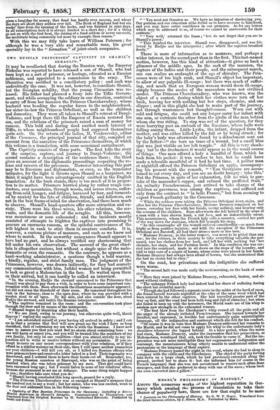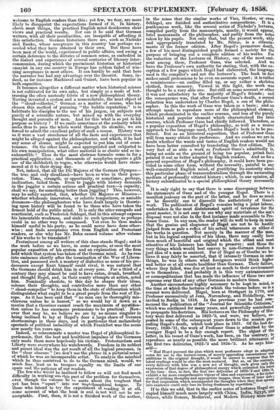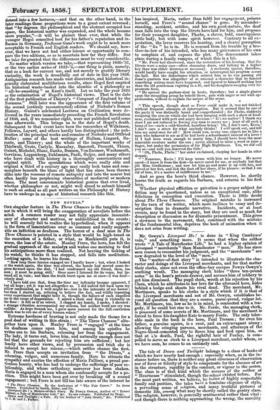HEGEL'S PHILOSOPHY Pr HISTORY. * AMONG the numerous works ns the
highest reputation in Ger- many which awaited process of translation to take their chance of popularity here, there are few that ought to be more • Lectures on the Philosophy of History. By G. W. F. Hepl. Translated front the third German edition, by .T. Sibree, M.A. Published by Bohn.
welcome to English readers than this; yet few, we fear, are more likely to disappoint the expectations formed of it. Ii history, above most things, the practical English mind desiderates clear views and practical results. Nor can it be said that German writers, with all their peculiarities, are incapable of affording it
this satisfaction. German historians there are' such as Niebuhr and Henke, whose acceptance in this country has perhaps ex-
ceeded what they have obtained in their own. But these have been men of the world, experienced in public affairs, and owing a certain deference to the dictates of common sense, as embodied in the dialect and experiences of several centuries of literary inter- communion, during which the preeminent historian or historical essayist in any one country in Europe has seldom failed of win- ning acceptance in most others. It can hardly be said that here the narrator has had any advantage over the theorist. Some, in- deed, as for instance Machiavel and Guizot, have been popular in both capacities.
It becomes altogether a different matter when historical science is not cultivated for its own sake, but simply as a mode of but- tressing the often unsteady fabric of a new philosophical theory. Having invented a system and a nomenclature, the next object of the "cloud-collector," German as a matter of course, who has chosen this method of pursuing "the bubble reputation," is to habituate his disciples to the use of his jargon, on subjects not purely of a scientific nature, but mixed up with the everyday thought and pursuits of men. And for this what is so pat to his purpose as history ? If we smile sometimes at the audacity which seeks thus to pass the whole world through its alembic we are forced to admit the excellent polic_y of such a course. History was as it were a vast storehouse of all the facts and experiences that might be alleged against the philosophaster, and which, if he had any sense of shame, might be expected to put him out of coun- tenance. On the other hand, once appropriated and subjected to his own manipulation, what other material is so elastic and so in- exhaustible ? Thus do the most abstruse formulso come in for a practical application ; and thousands of neophytes acquire a glib use of the shibboleth in vogue, who otherwise would have stam- mered at it to their dying day..
Not, indeed, that all the Du Majorca of the German Olympus— the true and only oloudland—have been so wise in their gene- ration. Time, strength, or opportunity, or sometimes, perhaps, inclination, failed them. Even to juggle with history demands in the juggler a certain serious and practical turn—a capacity, shall we say, for something better than juggling? This, however, may be safely asserted, that, whether Du Majores or Minores- whether wholesale innovators, or eclectic temporizers, or amiable dreamers—the plailosophasters who have dealt largely in theoriz- ing upon history will be found to be those who have taken the firmest hold of the public mind. It is only the utter renegade and reactionist, such as Frederick Schlegel, that in this attempt exposes his lamentable weakness, and sinks to such ignominy as perhaps could in no other way be compassed. Yet even he thus makes himself useful to his party, as he could never have done other- wise ; and finds acceptance even from English and Protestant readers, or else why has Mr. Bohn caused volume after volume of his works to be translated?
Preeminent among all writers of this class stands Hegel; and in the work before us we have in some respects, at once the most popular exposition of his system and an explanation of the firm hold which that system has taken of the German mind. As ho rose into eminence shortly after the termination of the War of Libera- tion, and possessed such a mastery of dialectics as none of his pre- decessors except Kant himself could rival, it was natural that the Germans should drink him in at every pore. For a third of a century they may almost be said to have eaten, drunk, breathed, and thought Hegel, and, in their scanty attempts at action, acted him. Nominally, obsolete, to this day he shapes their ideas, colours their thoughts, and contributes more than any other " cloud-compeller ' to keep them in the state of obfuscation which distinguishes what ought to be a great people from the rest of Eu- rope. As it has been said that "no man can be thoroughly mis- chievous unless he is honest," so we would lay it down as a maxim that a theorizer cannot reach the maximum of mystifica- tion unless he has enormous pretensions to be practical. How- ever that may be, we believe we are by no means singular in being inclined to lay at Hegel's door a large share of German shortcomings in these days, and in particnk, that melancholy spectacle of political imbecility of which Frankfort was the scene now nearly ten years ago.
Indeed, so consummate a master was Hegel of philosophical le- gerdemain, that the best and healthiest impulses of the Germans only made them more hopelessly his victims. Protestantism and Liberty were everywhere his watchwords. Freedom in its noblest and purest ideal was the net result of all the logical processes, in "clear clear obscure " (we don't use the phrase in a pictorial sense) of which he was an incomparable artist. To analyze the mischief which he thus contrived to do to the German mind, would, we much fear, lead us to trespass equally on the limits of our space and the patience of our readers.
The few who wou--1 be inclined to follow us will not find much difficulty in working otn, this part of the problem for themselves, -even though the volume be aa.. Darts about the toughest that
• yet has been "upset" into our u!= abilosophical tongue. To those who intend to try the experiment a reeling it at all, some account of what the book is and is not will not be un- acceptable. First, then, it is not a finished work of the author,
in the sense that the similar works of Vice, Herder, or even Schlegel, are finished and authoritative compositions. It is a
posthumous work, like the several series of Niebuhr's lectures,
compiled partly, from the manuscripts, mostly, it would appear, brief memoranda of the philosopher, and partly from the notes taken by his pupils. Not only that, but the present work, ably
and appropriately translated by Mr. Sibree, is a rifaccia-
mento, of the former edition. After Hegel's premature death, a few of his most distinguished pupils formed a society for the purpose of bringing out a complete edition of his works. For the redaction of the Lectures on History, one of the most emi- nent among them, Professor Gans, was selected. And we
have the Professor's own authority for stating, that, with the ex- ception of a few pages which Hegel had elaborated, the language used is the compiler's and not the lecturer's. The book in fact makes small pretensions to be even an accurate report; it is rather
a reminiscence—an outline filled up, or say rather a skeleton clothed, from memory. Viewed in this light, the work was
thought to be a very able one. But still on some account or other it was not satisfactory to the majority of Hegel's friends; and the consequence was, that after Professor Gans's death, a second redaction was undertaken by Charles Hegel, a son of the philo- sopher. In this the work of Gans was taken as a basis; and an attempt made to reproduce more of the philosophical element, which predominated in the earlier courses, and less of the purely historical and popular element which characterized the later courses, which Professor Gans had chiefly followed. Therefore, as a popular exposition of Hegel's philosophy, as well as a nearer approach to the language used, Charles Hegel's book is to be re- ferred. But as an historical exposition that of Professor Guns will from many obtain the preference. Ind we confess we are in doubt whether the wants and tastes of English readers would not have been better consulted by translating the first edition. The very fact of so able a work as Professor Gans's admittedly is, being set aside on the ground of being too popular, prima facie pointed it out as better adapted to English readers. And as for a general exposition of Hegel's philosophy, it could have been pro- vided in some other form, without the necessity, painful to any well-constituted English mind, of gratifying its curiosity about this particular phase of transcendentalism through the nauseating medium of profoundly vitiated history ; which, in our opinion all i htory subordinated to a special philosophical theory necessarily is.
It is only right to say that there is some discrepancy between the statements of Gans and of the younger Hegel. There is a manifest jealousy on the part of the latter, and he does as much as he decently can to discredit the authenticity of Gans's work. The in of Hegers remains being a Joint labour, undertaken in the most disinterested spirit of reverence for the
great master, it is not easy to see why any materials at the son's disposal were not also in the first instance made accessible to Pro-
fessor Gans. In any case, the reader will do well to keep in mind that the genius and eloquence of Hegel are not to be hastily judged from so pale a reflex of his actual utterances as either of the works in question. Not merely in the manner of the man, but in his logical exposition of his ideas, there may easily have been much of beautiful and original which the ablest and most attentive of his listeners has failed to preserve ; and those the very things which would best convey to non-German readers a just idea of a man so eminent. For of Hegel as of Goethe we be- lieve it may fairly be asserted, that if intensely German in some things he was in others what foreigners would think higher and better or at all events healthier than German. Their failure, where they failed, was due at least as much to their environment as to themselves. And probably it is this very extraneousness or cosmopolitanism that has made the influence of these two men supreme over that of any other Germans in modern times.
Another circumstance highly necessary to be kept in mind, is the time at which the lectures of which the volume before us is a resume were delivered. Hegel, born at Stuttgart in 1770, and Professor successively at Jena Nuremberg, and. Heidelberg, was invited to Berlin in 1818. in the previous year he had com- menced the publication of the "Journal for Scientific Criticism," which was continued for many years and powerfully contributed to propagate his doctrines. His lectures on the Philosophy of His- tory were first delivered in 1822-'3, and were, we believe, re- peated in some of the subsequent years down to the session pre- ceding Hegel's death, which took place in 1831. Of the last de- livery, 1830-'31, the work of Professor Gans is admitted by the younger Hegel to be a fair enough report. The object of the
i
latter, n his recast of Ganes work, has been on the contrary, to reproduce as nearly as possible the more brilliant utterances of the first two deliveries, 1822-'3 and 1824-'5. As he says him- self— " Had Hegel pursued the plan which most professors adopt in adapting notes for use in the lecture-room, of merely appending emendations ali.d additions to the original draught, it would be correct to suppose that his latest readings would be also the most matured. But as, on the contrary, every delivery with him was a new act of thought, each gives only the expression of that degree of philosophical energy which animated his mind at the time : thus, in fact, the first two deliveries of 1822-'3 and 1821- 5, exhibit a far more comprehensive vigour of idea and expression, a far richer store of striking thoughts and appropriate images, than those of later date, for that inspiration which accompanied the thoughts when they first sprung into existence could only lose its living freshness by repetition.'
If to this we add, that in the earlier series of lectures Hegel oc- cupied himself much more largely with China, India, Egypt, and Greece, while Roman, Mediteval, and Modern History were con- domed into a few lectures, —and that on the other hand, in the later readings those proportions were to a great extent reversed; that "by degrees the philosophical and the abstract occupied less space, the historical matter was expanded, and the whole became more popular,"—it will be plainer than ever, that while the younger Hegel consulted best for his father's reputation and in- fluence in Germany, Professor Gans's work ought to be much more acceptable to French and English readers. We should say, how- ever, that we have not had either leisure or opportunity to com- pare the two editions, so as to ascertain how far they differ. But we take for granted that the differences must be very considerable.
No matter which version we take,—that representing 1830-'31, or the two earlier series of 1822-'5,—one thing is plain, namely, that as a book for current use and not merely to gratify literary curiosity,. the work is dreadfully out of date in this year 1858. Antirinan research has made vast discoveries, and historical in- gemuty elaborated multifarious results, since Megel first emptied his historical waste-basket into the alembic of a philosophy as " all-be-smashing " as Kant's itself. Let us take the year 1825 i as the culmination of Hegel's historical views. That s the date of the first publication of Thierzy's "Conquest of England by the Normans." Still later was the appearance of the first volume of the second (entirely reconstructed) edition of Niebuhr's Roman History. Guizot's celebrated Lectures on Civilization were de- livered in the years immediately preceding the French Revolution of 1830, and, if we remember right, were not published until some time afterwards. This brings us to the date of HegePs death. Subsequent to that event have been the researches of Wilkinson, Fellowes, Layard, and others hardly less distinguished ; the pub- lication of the principal works and remains of Niebuhr and Ottfried Muller ; some of the best writings of Hallam' Lingard, Ba- rante, and Thierry ; and the whole of the important works of Thirlwall, Grote,Carlylei Macaulay, Bancroft, Prescott, Thiers, Guizot, Michelet, Blanc, Ranke, Bunsen, VonRaumer, Wachsmuth, Gervinus, Lappenberg, Dahlmann, Pauli, Geijer, and many others who have dealt with history in a. thoroughly conscientious and original spirit. The speculations which were really able and original a third of a century ago may easily look taine and. com- monplace beneath the blaze of light that has since been thrown alike into the recesses of remote antiquity and into the nearer but often hardly less perplexing obscurities of mediseval or modern times. The most consummate historical genius that ever lived, whether philosopher or not, might well dread to submit himself to such an ordeal as all past writers on the Philosophy of History have to undergo in an age of historical research like this.




































 Previous page
Previous page